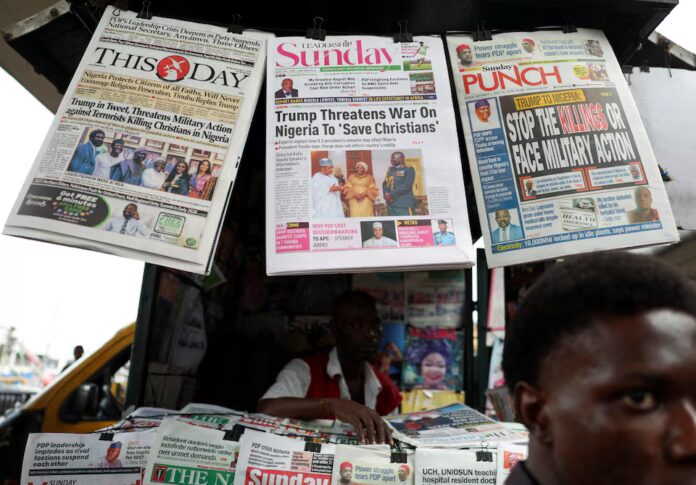No to imperialist threats — Yes to working-class unity and common struggle!
Since November 1, 2025, Nigerian media have been flooded with debates, commentary, and jokes over the recent escalation by U.S. President Donald Trump, who has threatened military action against Nigeria unless the government halts what he calls the “killing of Christians.” This development demands an answer by working class forces on the ground.
It is important to stress that terrorism and banditry have been the primary causes of killings across the Northern states for nearly two decades. These are compounded by ethno-religious crises, which ultimately stem from the failure of the capitalist system to provide security and decent living conditions for poor communities to survive and thrive.
What is happening?
U.S. President Donald Trump publicly announced that he has instructed the Pentagon (which he renamed “Department of War”) to begin planning possible military action in Nigeria, citing the alleged failure of the Nigerian government to stop killings of Christians. He further threatened to immediately cut all U.S. aid to Nigeria if the government does not act.
The Nigerian government, led by Bola Ahmed Tinubu, has categorically rejected the portrayal of Nigeria as a country that specifically persecutes Christians, noting that violence affects Muslims and Christians alike. Most of these conflicts are driven by resources, ethnic tensions, or insurgency, rather than purely religious motives.
Widespread killings and destruction of property are real and ongoing across Nigeria. In the North, Christians have been targeted in Benue, Plateau, and Northern Kaduna, as well as in Zamfara and Sokoto in the Northwest. In the South, kidnappings and killings are particularly concentrated in the Southeast, often targeting pro-separatist groups such as the Indigenous People of Biafra (IPOB).
These killings are a grave reality that plagues poor communities for years. Nothing has changed since the Tinubu administration came to power, either for better or worse.
Ethnic and religious tensions in Nigeria are based in the colonial past and the imperialist “divide and rule” strategy. They are exacerbated by the lack of resources, jobs and infrastructure, which pits communities against its other in a rat race for crumbs. To think imperialists care about the people involved is naïve- they are the ones who created this mess and they are the ones who profit from it.
Why we say no to imperialist intervention
Trump and US imperialists are eying Nigeria for two main reasons. One is the new scramble for Africa, as Western powers try to keep their hands on the continent’s vast resources while China and Russia try to expand their influence and reach. China’s warnings against US interference are a testament to this.
The second is that the narrative of “persecution of the Christian identity” has to be showcased for the US conservative audience.
In any case, military intervention by the US will not solve any of the underlying problems that fuel ethnic and religious conflicts—poverty, inequality, corruption and land or resource differences. Instead, they will create more bitter tensions that will haunt these regions for years to come.
The legacy of US military interventions in Iraq, Syria, Libya, Afghanistan etc suffice to show that these countries (so long as they even exist as such) are much worse off in comparison to how they were before.
Need for a working-class solution
In Nigeria, the victims of violence are overwhelmingly ordinary farmers, herders, and mining-area communities—both Christian and Muslim.
Working-class activists, unions and organizations in Nigeria should build networks that bridge Christian and Muslim communities, focusing on shared interests: the fight for public investments on infrastructure, job creation, public utilities, resource use and democratic rights. This common struggle will lay the ground for establishing security, resisting the “us versus them” mentality.
The Nigerian government must be held accountable for not protecting all citizens and not addressing systemic failures, including weak policing, impunity for attackers, land-use conflicts, and neglect of rural communities. Working-class mobilization can push for transparent investigations into attacks in vulnerable areas, strengthen community-based early warning and protection systems, and advocate for land reform for farmers, herders, and mining communities.
The struggle for public investments in public services and job creation in the most affected regions—northern Nigeria, the Middle Belt, and other marginalized areas—is crucial. The lack of jobs and social programs creates fertile ground for extremist groups to recruit from vulnerable communities.
Conclusion
Although Trump’s style sometimes includes performative statements and gestures which in the end never materialize, it cannot be excluded that Trump’s threats will lead to a military confrontation of some kind on Nigerian soil.
The working class movement and its organizations should steadfastly reject Trump’s imperialist threats. Instead, they have a duty to organise across ethnic and religious lines. They should also appeal to workers and youth in the US who also do not have any interest in being implicated in a new imperialist adventure to serve the interests of the US ruling class.
Nigerian workers and poor must pressure the Tinubu government to take real action to end insecurity and targeted killings, including in Christian-majority areas, but also across the entire country.
Neither Trump nor Tinubu and the Nigerian ruling elite care about working Nigerians. The solution to the security problems will not come from any of them- it will only come from working together towards ending the oppressive and exploitative system both sides represent, towards a socialist society where resources are used to meet the needs of all, not the greed of a few.



